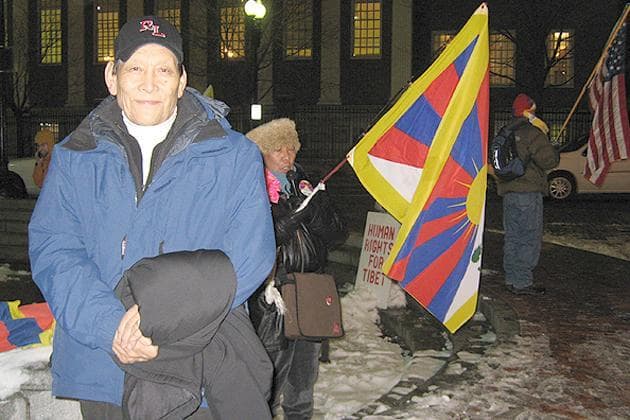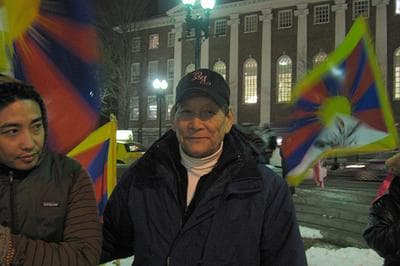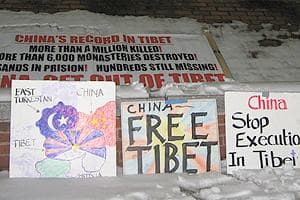Advertisement
Massachusetts’ First Tibetan Retains Cautious Hope For Homeland Sovereignty

At 27, Kuncho Palsang was the first Tibetan to set foot in Massachusetts. That was in 1965. Officially, he was a tourist, staying in West Roxbury with an American family he had met in India.
As Kuncho recalls in broken English, he fled Tibet for India in 1959 after the Chinese assumed control of his country. There, he became close with an American family working in India and lived with them periodically. In 1965, when the family was getting ready to move back to the United States, Kuncho begged to come along.
The process was fairly simple — the family sought permission from the Dalai Lama, who agreed, then some paperwork, and before he knew it, Kuncho was on U.S. soil.
"There were no Tibetans here at all, so people asked me, 'Who are you?' I say, 'I'm Tibetan,' " Kuncho said. "Nobody knows Tibet, so I asked them, 'Do you know Mt. Everest?' They knew Mt. Everest, but they don't know Tibet."
One year later, Kuncho's tourist visa expired, and he would have to return to India — a prospect that did not sit well with him. "I said, 'I don't want to go back to India. I like to stay here. I cannot go back to Tibet. This is my country.' "

Kuncho was desperate. He decided to go right to the top. "I write to President Johnson," he said. Kuncho recounts part of the letter, "I don't want to go back to India. Please, President Johnson, will you help me? I want to stay in the United States."
After three weeks, to much surprise, Mr. Johnson responded. Apparently taken with Kuncho's story, and after confirming the American family he was living with would be responsible for the young man, Mr. Johnson agreed to let Kuncho stay.
Kuncho's gratitude was endless. "As soon as I got green card, I write Christmas card to President Johnson," Kuncho said. "I sent two of those (Tibetan) yak dolls. He sent me a New Year card. I got four New Year's cards from him. Then after that he passed away. I am very sorry about it."
Kuncho got a job doing maintenance at Roxbury Latin School, and it was there, in the school's on-site apartment, that he lived along with his growing family — a wife and two daughters.

For nearly 30 years, Kuncho and his family were virtually alone as Tibetans in Massachusetts, with just one other Tibetan family settled in Salem.
Only about 500 Tibetans managed to make their way to the United States over that time, largely because of China's claim of sovereignty over Tibet, and the United States' reluctance to offend China by offering any kind of aid to Tibetan refugees.
But in 1989, a national non-profit group, the Tibetan U.S. Resettlement Project, convinced the U.S. government to grant 1,000 visas to "qualified displaced Tibetans," thereby giving them permanent U.S. residency and the right to work. At that time, approximately 120,000 Tibetans had fled Tibet since 1959, with most living in India and Nepal. Kuncho and his native brethren in Salem managed to bring 50 of them to the Boston area.
Today, that Massachusetts number has grown to nearly 600, and every Wednesday Kuncho and a handful of fellow Tibetans hold vigil in the pit at Harvard Square in Cambridge. They are surrounded by signs and banners, one large one reading, "China, Get Out of Tibet." A man in traditional Tibetan garb chants over a microphone, and those gathered pray silently for the freedom of their homeland.
Kuncho became a U.S. citizen in 1976, and after 42 years as an employee in the maintenance department of Roxbury Latin School, he finally retired last year. Today, as a gentle 72-year-old retiree, Kuncho is still confounded at how the Chinese claim Tibet as part of their country.
"I was born (and lived) in Tibet for 22 years. I didn't see any Chinese in Tibet when I was there," Kuncho said. "Language is completely different, and Tibetan money is completely different than Chinese. Writing: Chinese write up and down, Tibetans write right and left. It's completely different. Chinese says Tibet is under the China. I don't think so."
Many in the local Tibetan community were angry when President Obama in October canceled a meeting with the Dalai Lama over concerns it would negatively impact delicate negotiations with China the following month. But Kuncho understands. "He may be very busy at the time, you know?," he says, happy that Mr. Obama sent his senior adviser, Valerie Jarrett, to Dharmsala, India, to meet with His Holiness instead.
About Thursday's meeting between Mr. Obama and the Dalai Lama, Kuncho smiles. "I think it's good," he said. "I think President Obama knows it's different — religion, people, everything."
The fervent hope among Tibetans is that one day Chinese leaders will meet with the Dalai Lama, and that perhaps an American president can help make that happen. But Kuncho has little confidence that meeting will ever take place. For now, he says he has two nieces in India who he wants to bring to the United States but is unable to get visas for them.
Maybe he should write a letter to Mr. Obama.
This program aired on February 18, 2010. The audio for this program is not available.